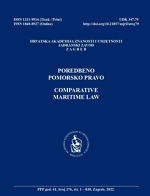The Legal Nature of a Bill of Lading Issued by the China-Europe Railway Express: The Chinese Perspective
The Legal Nature of a Bill of Lading Issued by the China-Europe Railway Express: The Chinese Perspective
Author(s): Shengnan JiaSubject(s): Law, Constitution, Jurisprudence, International Law, International relations/trade, Commercial Law
Published by: Hrvatska akademija znanosti i umjetnosti
Keywords: bill of lading; COTIF; SMGS; transport documents; negotiability; non-negotiable document; document of title; carriage of goods by railway; Belt and Road Initiative;
Summary/Abstract: The traditional bill of lading is integral to the carriage of goods by sea. It serves as a receipt for goods taken by the carrier, is evidence of the carriage contract, and is a document of title functioning as a negotiable instrument. The corresponding instrument in railway transport is a consignment note, which serves as a receipt and is evidence of the contract but is not a title document and, like the sea waybill, is not a negotiable instrument. However, this may be changing in China. Since the first route of the China-Europe Railway Express (CERE), YuXinOu, started operations on 19 March 2011, along with the development of the Belt and Road Initiative in 2013, the CERE has been growing rapidly. Consequently, the traditional nature of the consignment note on the CERE route is facing challenges. There are expectations of it serving as a document of title and, similar to the maritime bill of lading, acquiring a transferability function. The first judgment of a Chinese court on a dispute involving a railway bill of lading was delivered on 30 June 2020. It was held in that decision that a railway bill of lading could be regarded as a valid document of title with the attendant function of transferability. Notably, however, no express legislation has thus far been adopted; nor has any judicial interpretation been given that specifies its legal nature, even if market demand and policy considerations are in favour of this decision. Accordingly, whether there is sufficient legal foundation to confirm that a railway bill of lading can serve as a negotiable document of title remains uncertain. This article attempts to address these crucial issues.
Journal: Poredbeno pomorsko pravo
- Issue Year: 61/2022
- Issue No: 176
- Page Range: 677-703
- Page Count: 27
- Language: English

